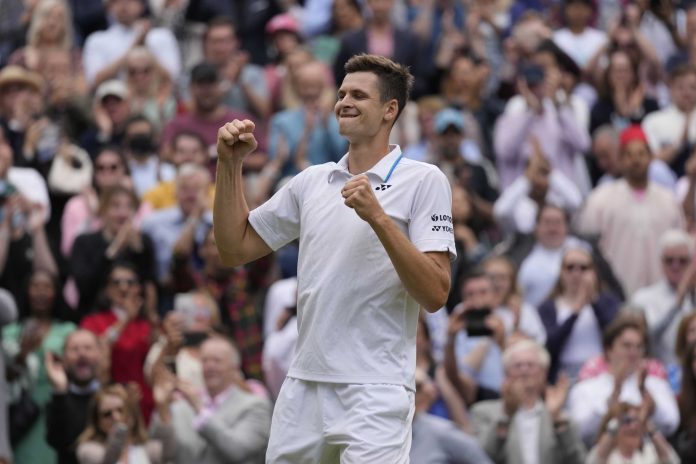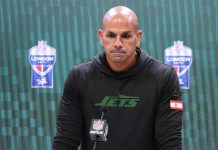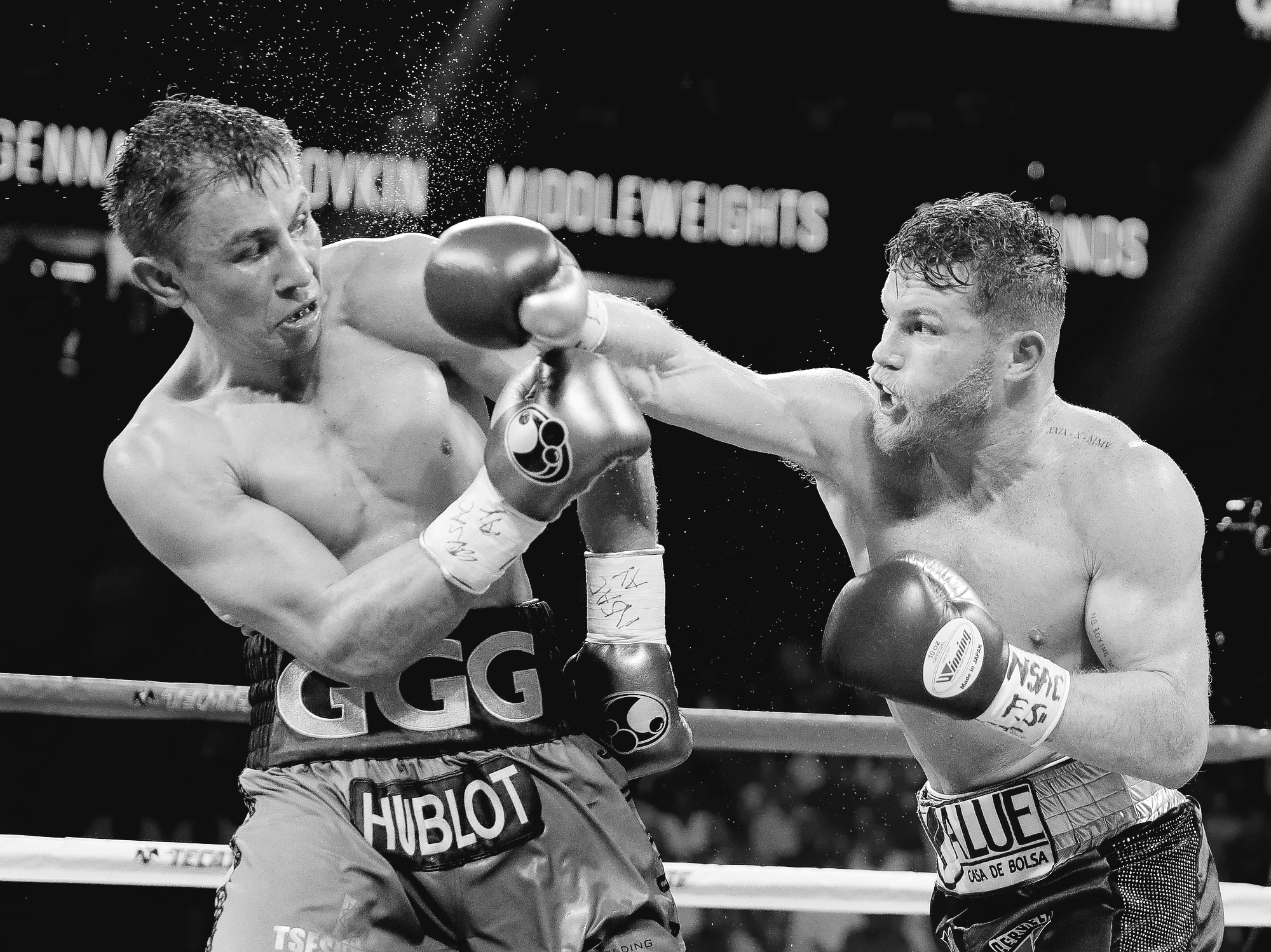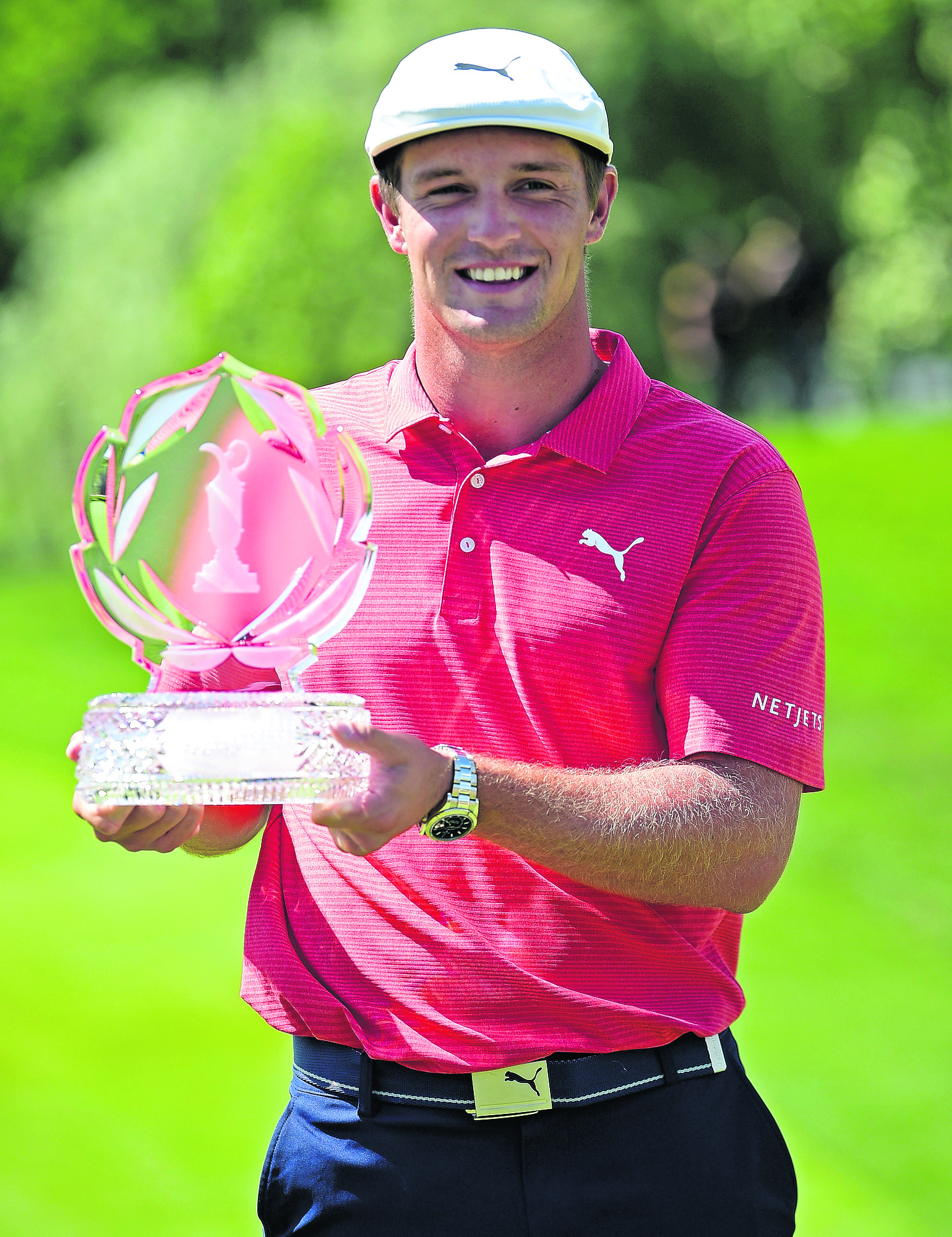
By HOWARD FENDRICH
AP Tennis Writer
WIMBLEDON, England (AP) — Roger Federer has been feted by plenty of ovations at Wimbledon’s Centre Court. None quite like this one, though. This was not a celebration and didn’t come at the end of the match.
Instead, it delayed the beginning of what turned out to be the last game of his quarterfinal loss and felt more like a “thank you” or — just in case — a “goodbye.” And Federer acknowledged afterward he isn’t sure whether he’ll be back.
The eight-time champion at the All England Club bowed out 6-3, 7-6 (4), 6-0 against 14th-seeded Hubert Hurkacz of Poland on Wednesday, a surprisingly lopsided finish to Federer’s 22nd appearance in the tournament.
Asked whether it also might have been his last appearance here, he replied: “I don’t know. I really don’t know. I’ve got to regroup.”
As for whether retirement is an immediate possibility, he offered this: “No, I hope not. … The goal is to play, of course.”
That likely was on thousands of minds in the stadium when Federer stepped to the baseline to serve while trailing 5-0 in the third set: He waited while fans in the full-to-capacity stands applauded and cheered, some rising to their feet.
Soon enough, it was over, only the third shutout set ceded by Federer in 429 career Grand Slam matches; both of the others came at the French Open.
“The last few games, obviously, you can feel that you’re not coming back from it,” said Federer, who spoke steadily and did not betray any emotion in his news conference. “I’m not used to that kind of situation, obviously, very much. Especially not here.”Hurkacz, a 24-year-old from Poland who has called Federer his idol, was asked whether he could have imagined this result.
“Probably not,” he responded.
And yet, this was not the Federer the world is used to watching. He underwent two operations on his right knee in 2020. He arrived at Wimbledon having played eight matches this season.
Factor in that Federer turns 40 on Aug. 8 and maybe it was too much to ask that he make his way to the closing weekend, even if this is a tournament he’s won more than any other man, and even if it’s contested on a surface, grass, on which he’s best.
He simply never was able to summon the serving and shot-making that carried him to 20 Grand Slam titles, tied with Rafael Nadal for the men’s record.
“I’m actually very happy I made it as far as I did here and I actually was able to play Wimbledon at the level that I did after everything I went through,” said Federer, who reiterated that he has not decided whether to go to the Tokyo Olympics. “Of course I would like to play (Wimbledon) again, but at my age, you’re just never sure what’s around the corner.”
Hurkacz’s opponent Friday will be No. 7 Matteo Berrettini of Italy, who eliminated No. 16 Felix Auger-Aliassime of Canada 6-3, 5-7, 7-5, 6-3 to reach his second major semifinal.
Hurkacz never had made it beyond the third round at any Slam.
In Friday’s semifinal on the other half of the draw, No. 1 seed Novak Djokovic faces No. 10 Denis Shapovalov.
After racing to a 5-0 lead at the outset Wednesday, Djokovic dropped three consecutive games to 48th-ranked Marton Fucsovics. Wasted five set points in the process, too. Soon enough, Djokovic righted himself, as he usually does, and beat Fucsovics 6-3, 6-4, 6-4 to reach his 10th semifinal at the All England Club and 41st at a Slam.
That allowed the 34-year-old from Serbia to continue his pursuit of a sixth championship at Wimbledon — and third in a row — along with a 20th major trophy.
There’s this, too: Djokovic is 19-0 at majors this season as he pursues the first calendar-year Grand Slam by a man since Rod Laver in 1969. Djokovic won the Australian Open in February and the French Open in June.
“I’m not chasing anybody,” Djokovic said. “I’m making my own path and my own journey, my own history.”
Shapovalov edged No. 25 Karen Khachanov of Russia 6-4, 3-6, 5-7, 6-1, 6-4, then looked ahead to facing Djokovic.
“I do believe that I have the game to beat him,” said Shapovalov, a 22-year-old left-hander from Canada.
Hurkacz appeared quite comfortable on this unfamiliar stage. He played sublimely, with three times as many winners, 36, as unforced errors, 12.
“Obviously, I was a little bit nervous. I mean, playing against Roger in a Grand Slam quarterfinal, it’s a very big thing for me,” Hurkacz said. “But I was trying to stay as calm as I could.”
Federer finally seemed to make some headway in the second set, ahead 3-0.
“Got to find a way to win it, somehow,” Federer mused afterward.
But Hurkacz conceded nothing.
Undaunted by the setting, the stakes, the foe or the almost-uniformly-for-Federer fans, Hurkacz claimed four of the next fives game to pull even at 4-all, breaking along the way with a stinging forehand return of a 101 mph serve that drew a netted a backhand.
In the tiebreaker — preceded by loud chants of “Let’s go, Roger! Let’s go!” and rhythmic clapping — it was more of the same: Hurkacz hitting his spots and Federer stumbling.
“Brutal,” Federer said.
On one foray to the net, he lost his footing and missed what could have been a simple volley.
The third set went by in a blink. When Federer missed a forehand wide to close things, he packed his bags and hustled off toward the locker room with a wave and a thumbs-up.
“Now that that’s over, you’ve just got to reassess everything. You’ve got to sit down, talk about it: What went well? What didn’t go so well? Where is the body? Where is the knee? Where is the mind?” said Federer, who will meet with his two coaches and other members of his team. “As you can see, it was a struggle for me.”
___



















